When a loved one is diagnosed with dementia, it is the beginning of a journey full of changes – physical, cognitive, emotional, and behavioral. Much has been written about these changes and how they relate to the stages of dementia, as well as how to help a loved one adjust and continue to live a purposeful life.
These are all important aspects of navigating dementia that families need to understand to properly care for their loved one. However, not as often addressed are the relationship changes that occur between a loved one with dementia and those they have known and loved all their lives. And, for so many families, those relationship changes can be devastating.
Here are a few of them:
Education is important to fully understand the disease and how it affects everyone.
At our Anthem Memory Care communities, we understand the challenges of this journey. Our communities offer support groups, and we have an abundance of resources to help you and your family navigate these changes together. We encourage you to reach out to us with your questions and concerns. You are not alone—we’re here to help.
February is a month all about hearts. First of all, it’s American Heart Month, which encourages awareness of the importance of heart health. But it’s also the month in which we celebrate the love in our hearts on Valentine’s Day.
Our Anthem Memory Care community residents always look forward to Valentine’s Day because it symbolizes all the years of love they have experienced throughout their lives. And it’s not limited to romantic love. They also enjoy celebrating the loving memories they have of their children, grandchildren and others who have held a special place in their hearts. And Valentine’s Day brings an opportunity for them to reach out to share their love, through acts of kindness with the greater community around them.
Below are some of the special activities our communities have engaged in this Valentine’s season.
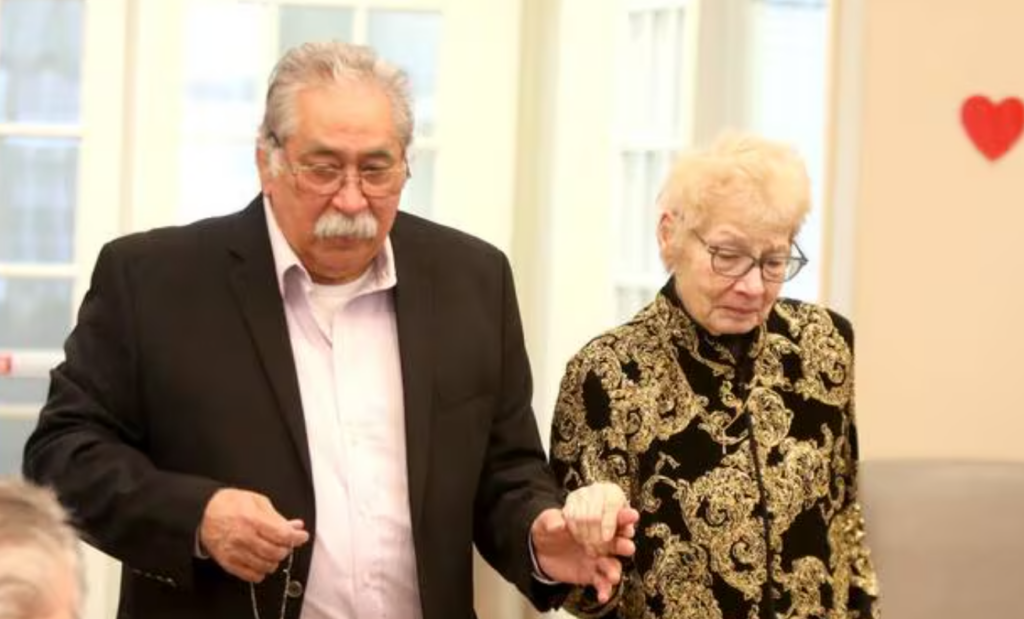
At Churchill Place Memory Care in Glen Ellyn, Illinois this lovely couple, along with two others, renewed their wedding vows. Such a touching, heartfelt ceremony!

For residents and families of Willowbrook Place Memory Care in Littleton, Colorado decorated heart shaped frames made perfect Valentine’s Day photo session props!

Big hearted residents of Franklin Place Memory Care in Franklin, Wisconsin used Valentine’s Day as an opportunity to give back by working with Street Angels on Wheels to hold a drive to help the homeless with clothing and hygiene supplies.
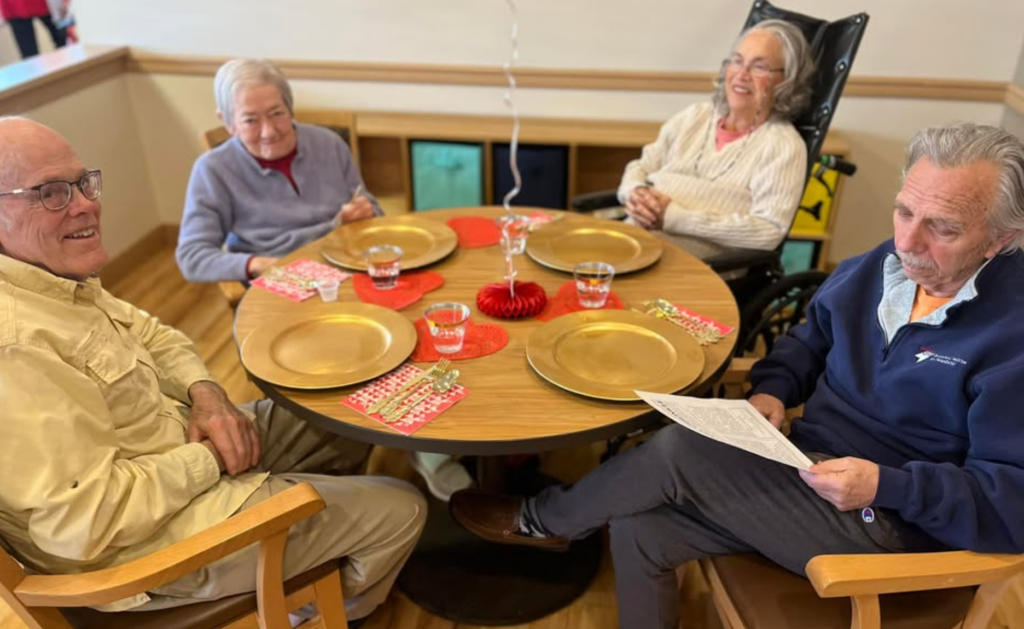
A special Valentine’s lunch was held for couples celebrating 40, 50, and 60 years of marriage at Chelsea Place Memory Care in Aurora, Colorado.
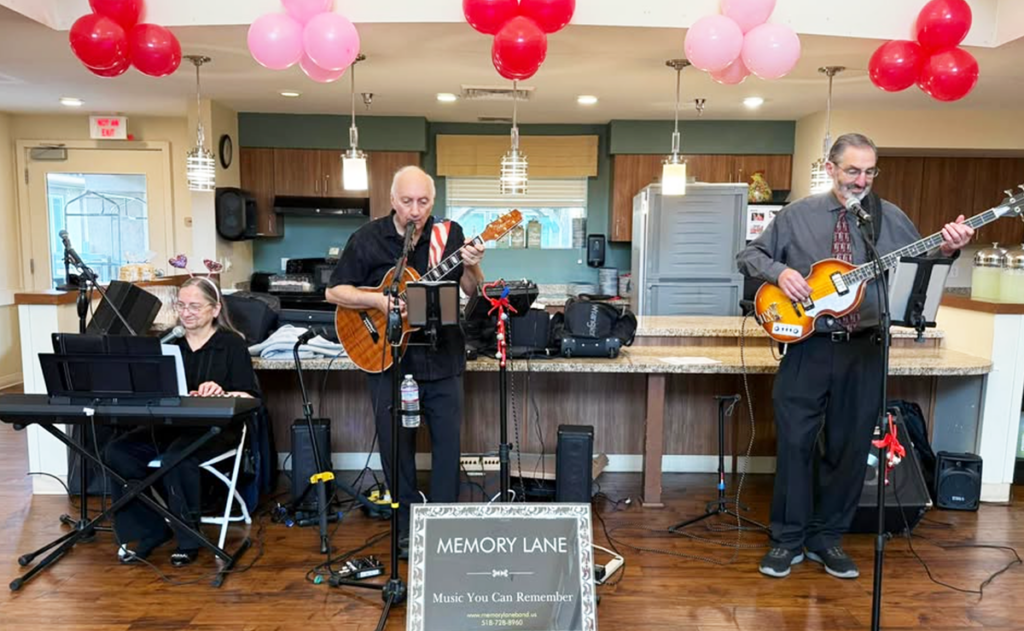
At Vineyard Place Memory Care in Murrieta, California it was an opportunity to take a stroll down “Memory Lane” with their favorite local band!
Most of us can remember special Valentine’s Days in our own lives. If you are caring for a loved one with dementia, ask them what Valentine’s Day they remember? Spark their memories by sharing some of your own recollections of handing out valentines in school or getting a surprise bouquet of flowers.
Valentine’s Day may occur one day each year, but with a little encouragement, the spirit of love that it represents can remain with us all year long.
(Don’t you love our header image? This resident of Chisholm Place Memory Care in Wichita, Kansas shares a laugh with the photographer.)
Renewing wedding vows is such a beautiful way to express everlasting love between a couple. At Chuchill Place Memory Care in Glen Ellyn, Illinois three couples renewed their vows in a beautiful Valentine's Day ceremony!
A collection of their wedding photos was on display as the couples walked down the aisle with fellow residents on either side.
The event was covered by the Daily Herald. You can read the full story here:
February is American Heart Month, an opportunity to focus attention on the importance of taking everyday measures to protect and optimize heart health. What you may not know, however, is that there is a clear relationship between a healthy heart and a healthy brain.
That’s why taking some time to understand the role the heart plays in brain health is important. And that includes cognitive health. The National Institutes of Health (NIH) has published studies finding a link between cardiovascular health and cognition. And, yes, the impact of heart disease on the brain can even lead to dementia.
What do we know about the relationship between heart health and brain health?
For the heart to adequately supply blood and nutrients throughout the body, its arteries must be healthy and strong. When they become blocked, every organ of the body quickly becomes impacted. This includes the brain, which requires a steady flow of oxygen-rich blood to function properly. If that blood flow is reduced or temporarily blocked a stroke can occur. When this happens, it can lead to a type of dementia called vascular dementia in which thinking skills are often suddenly impacted after damage to the blood vessels occurs.
The same factors that impact heart health are linked to brain health.
Research cited in a recent Harvard Health article indicates that many of the same risk factors that can lead to heart issues also can lead to dementia. These factors include obesity, high blood pressure, high cholesterol, and diabetes.
And while vascular dementia is most often associated with insufficient oxygen to the brain, newer findings point to heart issues potentially leading to other dementias, including Alzheimer’s.
What can you do to optimize both your heart and brain health?
At our Anthem Memory Care communities, we are big believers in working each day with our residents to keep their hearts and brains as healthy as possible. That means regular exercise, fresh air, brain-healthy foods and an environment that encourages connection with the world around them.
Feel free to reach out to us for answers to your questions and for resources to help your loved one improve their heart health. We welcome you to drop in to visit any of our communities and observe one of our exercise sessions. Our instructors will be happy to give you some tips and additional resources.
Residents and staff of Franklin Place Memory Care in Franklin, Wisconsin are doing their part to provide care and support to the Milwaukee homeless population. They hosted a drive to gather clothing and hygiene essentials for distribution through Street Angels Milwaukee Outreach, a mobile outreach organization that works to bridge the gap between homelessness and housing through advocacy and community collaboration.
Not only are they helping people in need, these charitable acts provide the residents with a renewed sense of purpose and a connection to their greater community.
The clothing drive was covered by the Franklin Patch. You can read the full story here.
Black History Month brings a welcome opportunity for all of us to focus on the achievements and contributions made by Black Americans. And there are many, which cover virtually every area of American life. That includes science and the study of the brain.
Dementia, which we know is a general classification covering several brain diseases that impact memory and physical health and present themselves in different forms. Alzheimer’s disease is the most common form of dementia. It was named after the doctor who discovered the disease, Dr. Alois Alzheimer.
What many people don’t know, however, is that Dr. Alzheimer did not work alone. He assembled a group of the world’s most talented scientists on his journey to discover the cause of this complex, terminal brain disease.
One of the scientists Dr. Alzheimer selected for his team was Dr. Solomon Carter Fuller, a Black African American psychiatrist who had published some of the earliest study findings on dementia.
The Alzheimer’s Association has written in depth about the work of Dr. Fuller. Here are some interesting facts about him:
Dr. Fuller went on to publish what is acknowledged to be the first comprehensive review of Alzheimer’s disease. He has left behind a legacy and a pathway for other Black scientists to follow.
Black History Month helps bring focus on the journeys of Black innovators and visionaries, like Dr. Solomon Carter Fuller. Their talents, perseverance, hard work, and significant achievements continue to serve as a beacon of hope and encouragement for future generations of Black scientists.
(Our header image of Dr. Solomon Carter Fuller was taken from an article on the website of Boston University, which you can access here.)
Residents of Pinnacle Place Memory Care in Little Rock, Arkansas are doing their part to support those impacted by the recent devastating wildfires in Southern California. They are hosting a drive to collect clothing, toiletries and other essentials to help the recovery effort.
Engaging in charitable acts is so important to our Anthem Memory Care residents. It restores a sense of purpose and connection to a worthy cause. We applaud Pinnacle Place and their ongoing efforts!
The drive was covered by the local Little Rock Channel 7 news. You can watch the video here.
Experiencing a sense of meaning and purpose in life is important to all of us. One way to achieve it is by finding ways to give back to those in need. Helping others, as they say, is the best way to help oneself. And nowhere is this truer than for those individuals living with dementia.
The link between experiencing a sense of purpose and improved cognition is supported by several studies. One, cited in the National Institute of Health, found that individuals participating in purposeful acts were able to maintain higher cognitive levels than those who didn’t participate. This included individuals living with dementia.
Anthem Memory Care residents and staff are active within their communities, reaching out to contribute to a variety of worthy causes. Our Pathways of Purpose programs enable Anthem Memory Care residents to engage in activities that connect and engage them in acts that stimulate their awareness of the value of giving back.
That is one of the reasons we encourage families with loved ones with dementia to include them as much as possible in their own participation in fundraisers and other charitable acts.
Below are just a few of our community activities that our residents and staff have enjoyed over this last year.
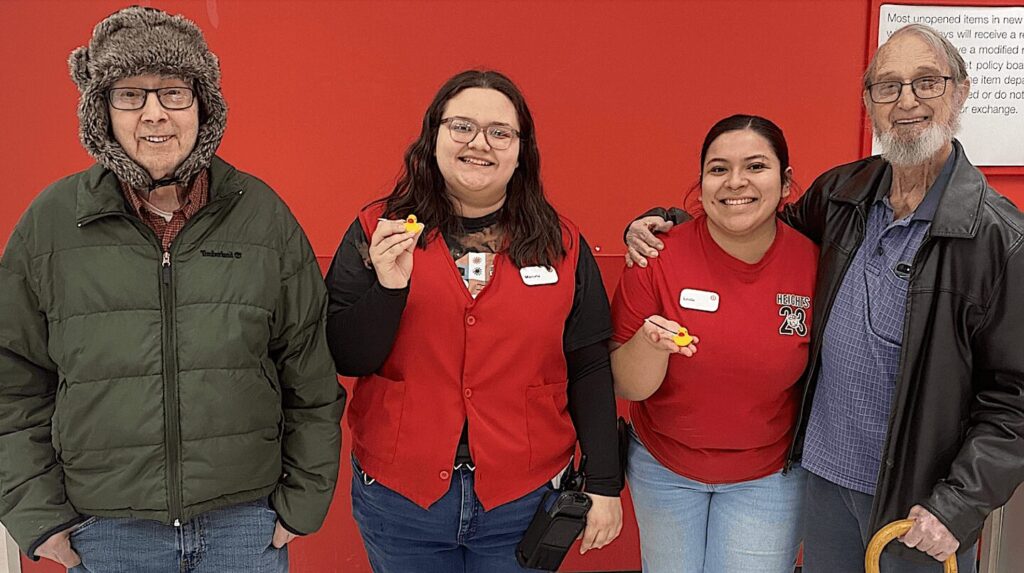
Chisholm Place Memory Care residents spontaneously hand out rubber duckies to local Target shoppers in Wichita, Kansas. Each ducky had a handwritten positive message. Shoppers were delighted.
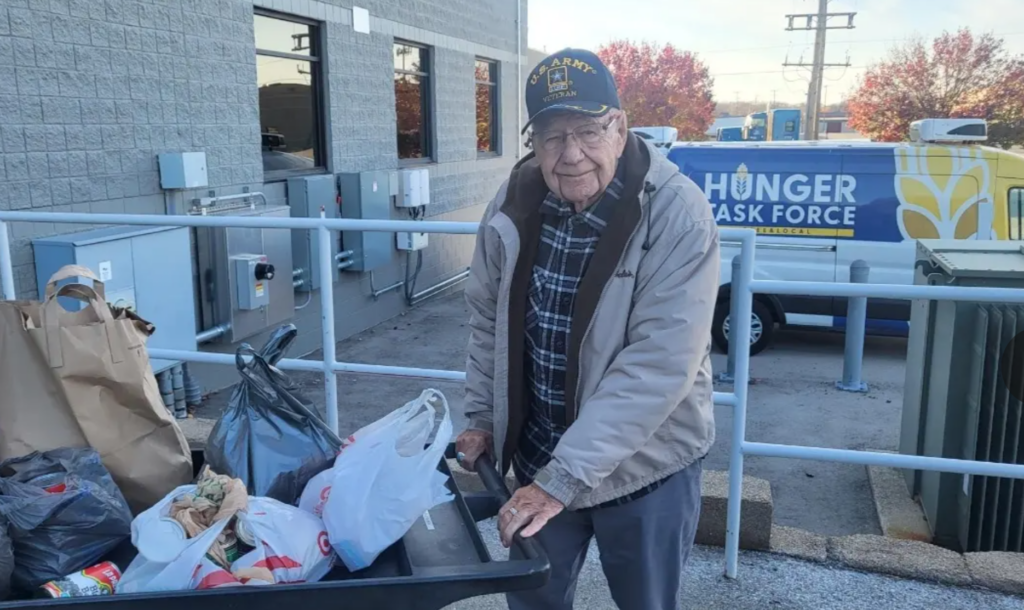
This Franklin Place Memory Care resident brings essential food items collected during their food drive to the Hunger Task force in Milwaukee for distribution.
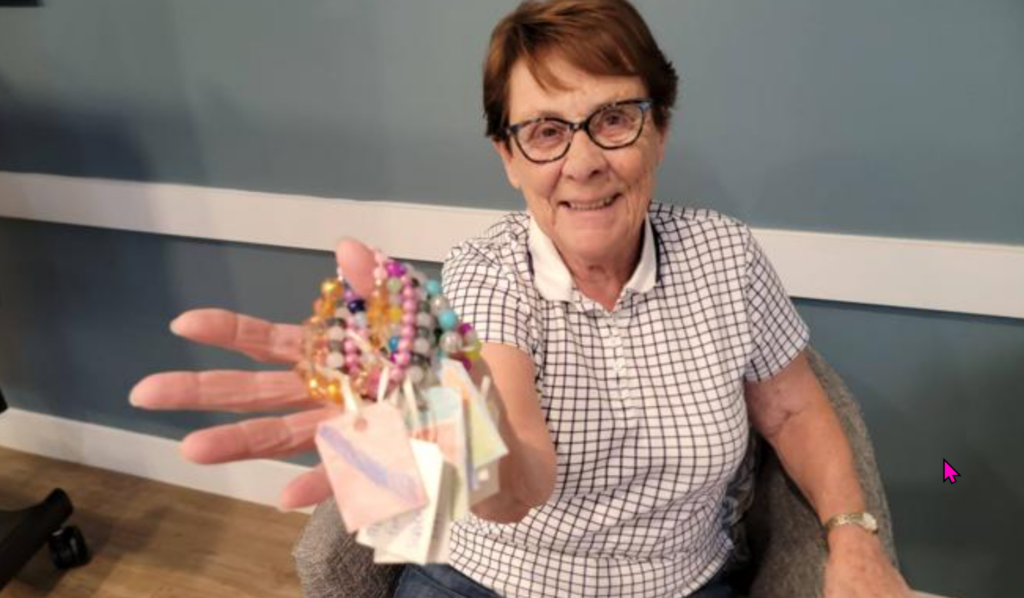
This resident of Cascade Creek Memory Care in Rochester, Minnesota proudly displays some of their hand-made bracelets which were put on sale to raise funds to help Florida hurricane victims.

Residents of Pinnacle Place Memory Care in Little Rock, Arkansas made special “blessing boxes” for their local Food Bank to distribute to families for Thanksgiving.
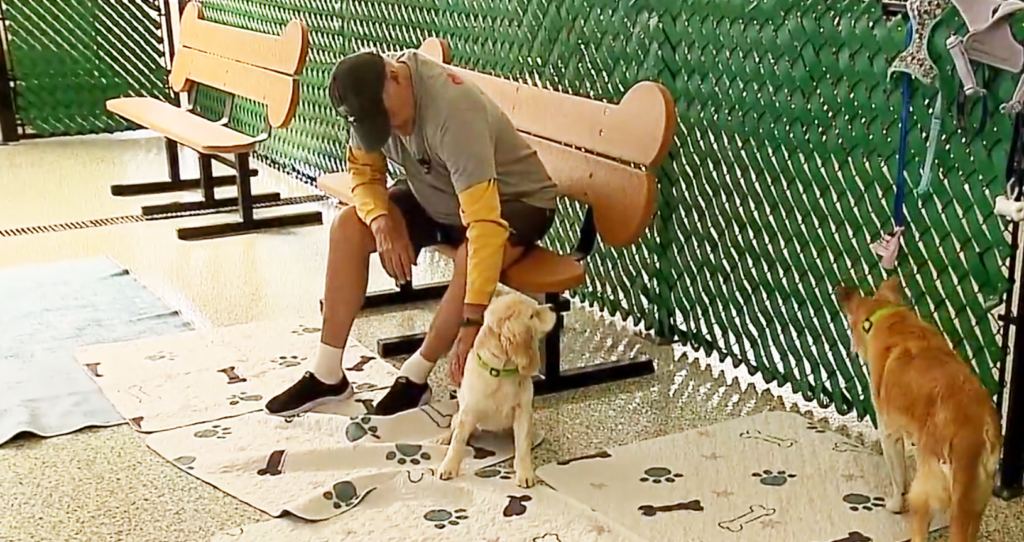
This resident of Highline Place Memory Care in Aurora, Colorado pets a dog at the local Senior Dog Sanctuary. The residents brought blankets and toys to gift their fellow seniors!
Family caregivers of individuals with dementia can bring this sense of purpose and connection for their loved one through many programs designed especially for their participation. If you are a family caregiver, reach out to your community and look for opportunities to give back to those in need. Include your loved one with dementia on as many of the activities as possible. It can do wonders for their sense of self-worth and yours as well.
Feel free to contact any of our Anthem Memory Care communities for advice and resources. Since we are regularly engaged in community activities we would be happy to connect you to local organizations that are ready and eager to include you in their work.
(Our top image shows a resident of Chisholm Place Memory Care in Wichita, Kansas displaying one of their hand-crafted coasters, sold along with keychains and bracelets as part of a special fundraiser in honor of a local Wichita firefighter, Ty Voth, who was killed in the line of duty.).
Concord Place Memory Care resident and artist, Fairy Stone, and her artist daughter Sheryl Jackson have shared a life long love of art.
The talented duo continue to team up, teaching art classes every Monday at Concord Place Memory Care in Knoxville, Tennessee.
“My mother and I have always worked together,” Sheryl Jackson told the Farragut Press, who covered the story. “Back in the day, when I was in the business, my mother did my framing for me. I had a fully equipped studio with a frame shop and everything, and my mother’s very, very talented.
You can read more about this talented mother/daughter team at Farragut Press.
A winter wonderland in Southern California? Residents and staff of Vineyard Place Memory Care in Murrieta, California made it happen (with a little help from a snow machine), inviting local homeschoolers from Our Lady of Fatima to come and play in the snow! Snowball fights, snowman building, and lots of laughter entertained the residents as they watched the children enjoy a taste of winter under the California sun.
The event was covered by the Press Enterprise. You can read the full article here.
In celebration of Rubber Ducky Day, Chisholm Place Memory Care residents surprised local Target shoppers by handing out rubber duck tub toys, each inscribed with a positive handwritten message. The gifts put instant smiles on the faces of grateful shoppers.
“Our residents were inspired by Rubber Ducky Day and wanted to put a smile on people’s faces,” said Jordyn Ridenour, life engagement director for Chisholm Place. “This project gave our residents a renewed sense of purpose. They were thrilled to surprise the shoppers with creative and uplifting messages.”
The event was covered by McKnight's Senior Living. You can read the full story here.
As we grow older, we begin to pay more attention to the impact of aging on our overall health. As issues crop up, more doctor visits are scheduled and we become increasingly aware of our growing list of limitations and restrictions.
This concern over health also extends to our mental acuity and issues involving memory. We may become a bit more forgetful and less adept at tackling more complex issues. For some older adults this is just a normal part of aging. For others it may be mild cognitive impairment (MCI) , a developing condition which can lead to dementia. Or, it may be the actual onset of dementia.
Regardless of whether an individual has a normal, aging brain or has been diagnosed with dementia, paying attention to brain health is key to optimizing cognition and preserving memory for as long as possible. There are things we can all do, regardless of age or condition, to improve our overall brain health.
The Mayo Clinic, Alzheimer’s Association and other organizations have published tips for improving brain health and memory. Here are some to consider as you strive to make the most of your own brain power, as well as that of your loved one with dementia:
It is also important to make sure both you and your loved one are keeping up with visits to the doctor and that you are addressing any medical conditions, such as high blood pressure, cholesterol levels, diabetes and any other chronic issues that can complicate daily health regimens.
Finally, don’t neglect your own health as a caregiver. Caring for a loved one with dementia is challenging and requires a great deal of time and attention. You need to keep your brain and body healthy to meet those challenges.
We encourage you to reach out to any of our Anthem Memory Care communities with your questions and concerns about the health of your loved one and yourself. We will be happy to help and to connect you with resources.
Residents and staff of Churchill Place Memory Care in Glen Ellyn, Illinois recently expressed their appreciation for the local police department. That appreciation came in the form of what they lovingly call "survival kits", bags filled with special treats.
The visit was in honor of Law Enforcement Day, but the residents and staff wanted to show their appreciation for all the hard work these first responders do every day of the year.
The visit was covered by the Chicago Daily Herald. You can read the full story here.
Seasonal weather changes impact all of us. A blazing hot summer day evokes a very different physical and emotional response than a cold winter’s day. Yet, what many families aren’t aware of is that these same seasonal changes that we navigate through without much difficulty can bring tremendous anxiety to an individual with dementia. There is a term for the impact of seasonal changes on some individuals. It’s called SAD (Seasonal Affect Disorder).
SAD is known to have an even greater impact during winter. And those darker skies and colder days during the winter can be particularly challenging on individuals with dementia.
Long, dark, winter days spent indoors can impact health.
Being cooped up indoors for extended periods of time isn’t healthy for anyone. When the weather is cold and the skies are grey, it can become isolating for an individual with dementia. The lack of activities enjoyed in warmer weather can impact physical fitness. Individuals may nap more during the day which can lead to more restlessness at bedtime. All of these changes can become major issues for a person already struggling with memory and other behavior changes.
Research also point to the negative impact of winter on cognition. One study conducted with over 3,000 dementia participants in the U.S., Canada and France, found that cognition was significantly improved during summer and fall than during winter and spring. That means that winter months can have a negative impact on memory and behavior of individuals with dementia.
If left unaddressed, prolonged winter blues can lead to depression.
In addition to impacting cognition, the culmination of feeling isolated and unmotivated to engage in normal activities can lead an individual with dementia into a state of depression. This can become a serious issue if left unattended to.
Dealing effectively with winter blues begins by acknowledging that they exist. The next step is to realize that there are things you can do to help mitigate the impact of dark winter months on your loved one’s physical, cognitive, and emotional wellbeing.
Here are a few tips to help your loved one get through these months and help improve your own health and outlook as well:
Being aware of the impact these long, cold winter days can have on the emotional, physical and mental health of individuals with dementia is a critical first step for family caregivers. Taking actions, such as those above, will help to keep your loved one engaged and connected in a more positive way to you and their surroundings. They will feel better and more alert, and their mindset will be more positive. So will yours. And remember to remind them that winter will not last forever. The sun will shine again!
We encourage you to reach out to any of our Anthem Memory Care communities for more tips on how to help conquer winter blues for your loved one and yourself. We’re here to help!
Setting a doctor’s appointment for a loved one who is showing signs of dementia is a unique and often daunting experience for families. Where to begin? Who to call? What will the next steps be? How will my loved one deal with the diagnosis?
Start by setting up an appointment with your loved one’s general physician.
Your loved one’s GP is typically the one they are most comfortable visiting. They are equipped to begin the process of having them tested. Some may conduct the tests themselves or oversee the process conducted by a trained specialist. According to the Alzheimer’s Association, most trained physicians are able to provide an accurate diagnosis 90% of the time.
In advance of your initial visit:
The Alzheimer’s Association also recommends jotting down some questions to ask, which might include:
On the day of your visit:
Harvard Health has published some good tips for optimizing your initial visit and making it less stressful on you and your loved one. We’ve paraphrased a few of them below:
After a diagnosis of dementia has been made, the follow up begins.
Once a dementia diagnosis is made, the journey of care and support begins. This new chapter involves navigating various steps to ensure your loved one receives the best possible care. While it may feel overwhelming at first, breaking the process into manageable pieces can help you focus on what needs to be done and when.
In addition to continuing regular checkups with your loved one’s primary care physician, you may need to coordinate appointments with a team of specialists. These healthcare professionals might include any of the following: neurologists, neuropsychologists, therapists, and nurses, among others. Each plays an important role in assessing cognitive changes, developing personalized treatment plans, and addressing your loved one’s unique needs.
With the help of these experts, your family can better understand the progression of dementia and explore strategies to enhance your loved one’s quality of life. While it’s natural to feel uncertain at first, know that you are not alone—support and guidance are available every step of the way.
By following the tips above, those doctor visits will become less hectic and more routine as you and your loved one become acclimated to their care plan. Consider gaining access to your loved one’s patient portal. This will help you stay on track and organize doctor visits more easily.
Remember, too, to encourage and accept support from family members and close friends. Your loved one’s care journey is not one to take alone.
Feel free to reach out to any of our Anthem Memory Care communities as you begin this journey. We have resources to help you in all aspects of loving and caring for your loved one and, just as important, for yourself!